"We have a Society whose main job is to bring together people who have a general interest in the Napoleonic period."
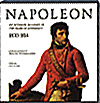 Proctor Patterson Jones is the new president of the Napoleonic Society of America, and the editor/compiler of Napoleon: An Intimate Accont of the Years of Supremacy 1800-1814, a unique and visually stunning book that has received numerous accolades, including high praise by the New York Review of Books which called it "A Napoleonic museum within covers." Jones' Napoleon is an amazing visual archive which did not fail to awe our reviewers. It is a first-rate collector's item for Napoleonic bibliophiles.
Proctor Patterson Jones is the new president of the Napoleonic Society of America, and the editor/compiler of Napoleon: An Intimate Accont of the Years of Supremacy 1800-1814, a unique and visually stunning book that has received numerous accolades, including high praise by the New York Review of Books which called it "A Napoleonic museum within covers." Jones' Napoleon is an amazing visual archive which did not fail to awe our reviewers. It is a first-rate collector's item for Napoleonic bibliophiles.
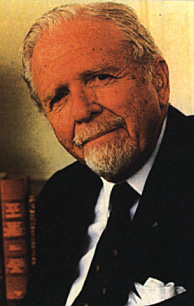 Jones was born in 1916 in Cleveland, Ohio, where he grew up in a family of French ancestry. He attended Case Western Reserve, Stanford, and harvard. A lawyer, author, and a prise-winning photographer, Jones also served in the US Army in World Was II. He currently lives in San Francisco with his wife Martha where he is Honorary General Consul General of Tunisia. He recently hosted former President Gorbachev at a dinner in his home. He has six children, eight grand children, and three great grandchildren.
Jones was born in 1916 in Cleveland, Ohio, where he grew up in a family of French ancestry. He attended Case Western Reserve, Stanford, and harvard. A lawyer, author, and a prise-winning photographer, Jones also served in the US Army in World Was II. He currently lives in San Francisco with his wife Martha where he is Honorary General Consul General of Tunisia. He recently hosted former President Gorbachev at a dinner in his home. He has six children, eight grand children, and three great grandchildren.
Respected within the NSA community, Jones has teken the reins of the organization after a turbulent struggle.
"...out there someplace are at least 12,000 people we'd love to have in our organization."
N: Mr. Jones, as the new President of the Napoleonic Society of America, what do you see as your personal goals for the future of the the organization?
Jones: We have a Society whose main job is to bring together people who have a general interest in the Napoleonic period. This includes amateurs and professionals, anyone who has an interest or appreciation of the time. We try to sponsor activites which will bring information to our members, including our annual convention. We try not to be too intellectual. This is not a strictly academic Society by any stretch. If you want to learn something you can, and if you want to have fun you can have it. And you're talking with people who have a similar interest to your own.
N: How large is the organization?
Jones: They [NSA's previous administration] were bragging about having 1,800 members after eleven years. Incredibly, since 1992, we've sold probably 12-14,000 copies of a $95 book. This represents an enormous amount of interest in Napoleon which exceeded my expectations. So out there someplace are at least 12,000 people we'd love to have in our organization. I don't think we've scratched the surface with only 1,800 members. We've got to do a better job getting the word out. And that got me to asking some questions about how we were running our organization.
So as for the future of the Society, we've just sent out a full explanation of what has happened in the past and we have laid out our future plans.
N: Can you elaborate?
Jones: What we are now trying to do is to bring the management of the Napoleonic Society of America more into the board of directors. We want to get away from one man making decisions and trying to operate the program all himself. We now have a brilliant board and I've never been associated with a better group of people. They are imaginative, welcoming new ideas, and I think that our scope will be widened. I felt a little bit constrained in the former administration, and I think the other people did too.
N: In terms of what you could achieve?
Jones: Absolutely. And now we are able to operate on a more democratic basis. The board of directors will decide to do something or not to do something. We may decide, for example, to set up an educational foundation to financially assist people who are studying in this field. At first it won't be very much, but as our little trust grows, it'll become a mechanism for giving scholarships. Professor Horward at Florida State University, who is director of the Institute on Napoleon and the French Revolution, will assist us in this project. I think we'll have the means and I think people will contribute to it. It'll be very constructive.
N: What are the NSA conferences about?
Jones: Each meeting there are five to eight papers presented which cover some part of Napoleon's career or era.
N: Can you give us an example of a topic?
Jones: As a example from my own work, I gave a paper once on the Malet conspiracy. It was a coup attempt done while Napoleon was in Russia by a man who, I think he was demented, but at any rate he had leadership qualities and nearly pulled off a revolution while Napoleon was out of France. The details of it, which are glossed over in
"...Hitler left nothing, Napoleon left everything."
many history books, are rather fascinating. It's most amazing really how this fellow was able obtain assistance in his scheme.
The NSA and the Image of Napoleon
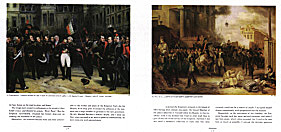 N: Napoleon certainly remains a
controversial figure. How do you see
Napoleon and the Napoleonic Society in terms
of what kind of presentation you want to make
about the man and about the era?
N: Napoleon certainly remains a
controversial figure. How do you see
Napoleon and the Napoleonic Society in terms
of what kind of presentation you want to make
about the man and about the era?
Jones: We can present other perspectives instead of relying on those who write from the Royalist or English point of view about the "usurper" or the "terrorist" or the "tyrant." The problem has been that too many people approach Napoleon Bonaparte the way they think he was. I think my work and the purpose of the NSA should be to at least get Napoleon, as we so like to say, "a level playing field."
N: It seems that you have more interests in the non-military aspects of the period. What about Napoleon's other accomplishments, in areas like law, science, education and industry? What was his relationship to the Revolution?
Jones: Although he was a product of the French Revolution, Napoleon was not a revolutionary. I mean he was not a political leader like Marat; he was a soldier. But he saw what was happening in the Revolutionary government, which, by the way, wasn't all destructive. As a matter of fact, the Code Napoleon had been discussed and in some ways developed during the Revolutionary period. Same way with some of the educational institutions. Not finalized, but at least started. And when Napoleon came in he completed many of them.
For instance, I think he attended something like 70 meetings in connection with the Code Napoleon. He was there more or less as the acting chairman and he was very active in getting the brilliant law givers to develop ideas.
N: What do you think about the book and others comparing Napoleon to Adolf Hitler?
Jones: Well, just to very quickly to answer that question, Hitler left nothing, Napoleon left everything. Hitler's was a repressive rule of autocratic control. Napoleon's was a more productive use of his power. I heard a great English expert on Hitler answer that question once, and I don't think he went much further than that.
Every day we are affected by Napoleon, although we may not realize it. As one small example, our street numbering system was Napoleon's idea.
I know people who think Wellington is wonderful. There's another comparison for you. Wellington Napoleon. You can take the work of Wellington and, outside of his military career, you end up with a book that might be fifteen or twenty pages. Take out the war efforts of Napoleon, and you still have forty-two volumes that reach to the ceiling, you know. I'm exaggerating a bit of course, but you see my point. You really can't compare the two men.
N: And of course the methods the two men [Napoleon and Hitler] employed were radically different too. It seems like an unfair comparison considering there were no death camps or this kind of repression under Napoleon.
Jones: That's right. Of course Napoleon dealt harshly with people who were disruptive of his policies. Hitler went after people because they were of a certain race, or religion. I just don't think there's any comparison at all, and when people try to compare them it's a very bad and misleading thing.
The Story Behind the Making of Jones' Napoleon:
N: You published a book that has been recognized as one of the most beautiful books ever done on the Napoleonic era. It's filled with art and other information about that period. Is art your main interest area?
Jones: No. The art was Napoleon's way of recording and safeguarding his accomplishments. Without cameras, they were dependent on artists who had been given instructions to sketch certain things, from battles to what went on within the Tuileries, etc. Of course, they had to portray Napoleon as a great leader, which he was.
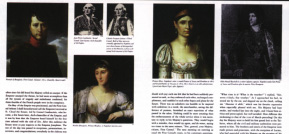 And you'll notice that after 1815 there
were precious few paintings made. We
are running across that problem now in
my second book on the captivity of
Napoleon. Nobody recorded that phase
of his life in any glorious full color work,
you know.
And you'll notice that after 1815 there
were precious few paintings made. We
are running across that problem now in
my second book on the captivity of
Napoleon. Nobody recorded that phase
of his life in any glorious full color work,
you know.
N: The book is about both Elba and Saint Helena?
Jones: Yes. There are no serious paintings about Elba or Saint Helena. Some artists subsequently did work, but there are no great things that are in the Louvre on those two subjects.
N: What was your goal with the book? What did you hope to accomplish by doing it?
Jones: Well, there is no precise answer; it's complicated. As I explain in the introduction, when I was a little boy about seven years old I had done something wrong. My mother sat me down and said my punishment was going to be to write an essay on Napoleon Bonaparte. So I started to write it, and she was helping me to spell the words and all, but the telephone rang and then that was the end of that procedure. Then, seventy years later, I picked it up again [laughing], to finish my essay on Napoleon.
For many years, I never really perceived Napoleon as the great man I subsequently found him to be. One evening we were calling on some people in Paris, and during the conversation Napoleon was mentioned in some way or other, and I started to make a negative remark about this "dictator." Our hostess said, "Look, just wait a minute." She went out of the room and brought back a great big hat box which was filled with snippets of paper and envelopes. There must have been two or three hundred things in there, letters that Napoleon had written, notes he'd written, instructions he'd sent.
It turned out that this woman was a direct descendent of General Lemarois. He was a young friend of Napoleon who had been the witness at Napoleon's wedding, as a matter of fact. Because he was underage, it was one of the excuses for legalizing the divorce between Napoleon and Josephine. So I had to then excuse myself from the conversation because I simply had to look at all this fascinating material. I suppose that got me interested.
N: That was your personal turning point you think?
Jones: Well, it was certainly something that motivated me. And then I discovered that I had very good contacts in Paris, many of whom have Napoleonic connections. So, this project just began to grow and then I realized there was this beautiful collection....No, I know what did it really. I went to an old church book sale, and I picked up one volume of Constant's Life of Napoleon. Constant's work is not respected by serious students because it was written by about five other people, all scholars. But Constant was Napoleon's first valet, and there are certain things that the scholars couldn't have known anything about, but Constant obviously did. And these things I recognized. So, then I looked more seriously at it and thought "This is really interesting material and it ought to be reprinted." Then I got the other three volumes and read them all.
I guess the last piece of the puzzle is some of my experience in publishing. When I wrote law for Bancroft Whitney, a big legal publishing house in San Francisco, it gave me the discipline on how to handle lots of intricate materials. I must have edited fifteen or twenty volumes for them. I learned to get the important things in and make sure that they were supported.
N: What, overall, did you hope to accomplish with the book?
Jones: Well, I hope to lay a foundation. Compared to this age of ersatz leadership, Napoleon is a giant. I thought it would be interesting to get all these pictures together because they had never been published all together. I don't know that we got every one of them, but we certainly got 90 percent of the great canvasses that were done.
Not only that, but I found as I read these two books I realized that these two men [Constant, his valet, and Meneval, his first secretary] lived cheek-by-jowl with Napoleon for about ten years. And if anybody had an interesting story to tell, theirs would be interesting because they were with him early in the morning, late at night, in the middle of the day, doing his bidding. And evidently each was taken into Napoleon's confidence.
There were other significant people who observed Napoleon during this period. If I had the book to do again I might try to involve these other people, but as it is I've got a book that's so heavy you can hardly carry it [laughing].
N: Who were the other writers you were thinking of including?
Jones: Well, Barras would be one, I think because he really pushed Napoleon into doing what he did on the 18th Brumaire, although Barras had nothing to do with him after that. Madame deStael. Also, I thought of using Madame Junot. But this is chatter you know, whereas the other stuff was solid historical recollections.
N: You mean by people who knew Napoleon intimately. Others were observers?
Jones: Yes. Well, they were observers. Madame Junot 's husband had been a famous general who finally went crazy. Her work is very interesting, but I didn't think it was on the same level with these other people.
N: So you had to be selective about what finally went in because ultimately you had a limit of how much you could put in the book?
Jones: That's right. I think the book probably covers a tenth of the material that was available in both of their works [Constant and Meneval]. But as I said before I had to discount certain things that Constant said because I knew he wasn't there. I mean a valet wouldn't be in the middle of some important meeting, you know.
N: Right. So you only included those reminiscences where the author possessed first-hand knowledge?
Jones: That's exactly right. Now, when we get into the next series of books, there are a lot more people involved. And I'm thinking about the people on Elba. For example, I own the English rights to Louis Marchand's [Napoleon's valet on Elba] diary. Eventually we'll reprint that.
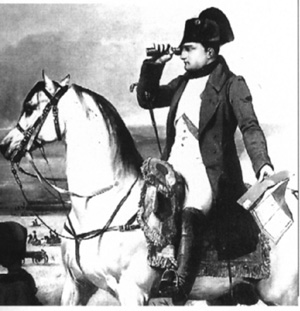 N: The book is remarkable in the number of
paintings and illustrations. How many years
did it take you to assemble all of it?
N: The book is remarkable in the number of
paintings and illustrations. How many years
did it take you to assemble all of it?
Jones: I think about two years, something like that. But you see there are agencies that have these transparencies in France. And you just have to buy them. I think the rights to the pictures probably cost me about $40,000.
N: But the book states that some private collections also were found. It must have been exciting to be able to locate, as you said, 90 percent of the canvasses that were available from the period. How did you make contact with all these different people?
Jones: Well, first of all my friend is Otto Zieseniss who is the curator at the Versailles. A delightful man, well educated. He led me through it all. Both of his parents were Americans but they lived in France. I got to know the people in the archives, so I had plenty of assistance and direction in obtaining what I needed for the book.
Zieseniss took me out to Versailles on a private tour. Here were many of these paintings. I said all of these can be reproduced.
N: How many of those were from private collections?
Jones: One or two. Most of them were from Versailles or the Louvre and were available through an organization called the Musee de France which is the agency that handles the sale of the rights. Then there were books about the history of Napoleon which were beautifully done. We included illustrations from those. An artist by the name of Job illustrated books for children on the history of Napoleon in the 1880's. These are very interesting and we used them. There were also a lot of period engravings that we used.
N: And then you had it put together in the United States, and you financed the publishing of it?
Jones: Yes.
N: Did you try to find a publisher or did you decide to just do it on your own from the very beginning?
Jones: We did shop it a bit. I went to various publishers both in Paris and in New York. But the thing appeared so expensive to produce that nobody wanted to touch it. I finally went to see Irving Stone, who was a friend of mine. And he got me in touch with-I guess his wife got me in touch with-their man at Random House. They looked at the book and shook their heads: "No."
In frustration I said I would build the product, first class, and they could then distribute it and we'd split 50-50 at the cash register. What I didn't realize was that there was a split of 50-50 even before that with the cash register,
"...you can have the full story of Napoleon as seen by the people who worked with him."
with the stores [laughing]. We certainly didn't make very much money on our first printing. As a matter of fact, I think the book is now almost paid for, and certainly between Random House and me, we have taken in about what the book cost.
N: Which you said was about $300,000?
Jones: Something under $200,000.
N: And the book is now in its second printing?
Jones: Yes, that's right.
N: That's very encouraging. How many books were done in thefirst printing?
Jones: I think we did 10,000 books.
N: 10,000?
Jones: Then we did 6,000 more in the second.
N: Isn't it unusual for a book about Napoleon to sell that well in the United States, especially a $95 book?
Jones: Yes. Random House did a wonderful job of pushing it. It couldn't have been done better. I understand that even in Japan, for example, there is a lively interest in Napoleon. Not enough to buy a $95 book, unfortunately [laughing]. Having it translated means you end up with a book half again as long, for some reason.
When I'm finished I think there will be one volume that will deal with Napoleon from his childhood up to the Brumaire.
N: So you're looking at having a three volume set about Napoleon's entire life when this is done?
Jones: Actually, it will be four or five volumes.
N: Four or five?
Jones: I know that the last part is going to take about two books.
N:Really? Both Elba and Saint Helena require two volumes to do?
Jones: Yes.
N: Are they going to be equivalent to this book in terms of size and number of pages ?
Jones: They will be very similar. I don't know how many pages they're going to have. I think we'll end up trying to do about what we did with this book, so you can have the full story of Napoleon as seen by the people who worked with him. These contemporaries of Napoleon actually witnessed him working and were in a unique position to comment on his actions and describe him as a man.
N: So you're just letting these first-hand observations speak for themselves rather than write a new narrative?
Jones: Yes. Others have tried to do the whole Napoleon story. Masson for one, Sloane for another.
N: Masson and Sloane?
Jones: W. C. Sloane wrote four volumes. And Frederic Masson wrote several books. I think my books will be of value. I know my book was used as a reference for an opera put together in Toronto last year.
N: What opera was that?
Jones: Oh, it was an effort to tell Napoleon's story. It was pretty good. We went to see it and the music was fine. I asked the director if he was familiar with my book. He told me it was falling apart from being used so much [laughing].
N: It certainly could become a key reference book, not only because of the wealth of visual information, but also since it should be easier to obtain than the other books.
Jones: That's right. And they'll get the whole story in one set of books.
N: This sounds like a worthy endeavor. Is there anything else that you'd like to add, anything that we haven't covered?
Jones: No, I can't think so. After you leave of course I'll think of five hundred things I should have said.
Back to Table of Contents -- Napoleon #1
Back to Napoleon List of Issues
Back to MagWeb Master Magazine List
© Copyright 1995 by Napoleon LLC.
This article appears in MagWeb (Magazine Web) on the Internet World Wide Web.
The full text and graphics from other military history magazines and gaming magazines are available at http://www.magweb.com
Order Napoleon magazine direct